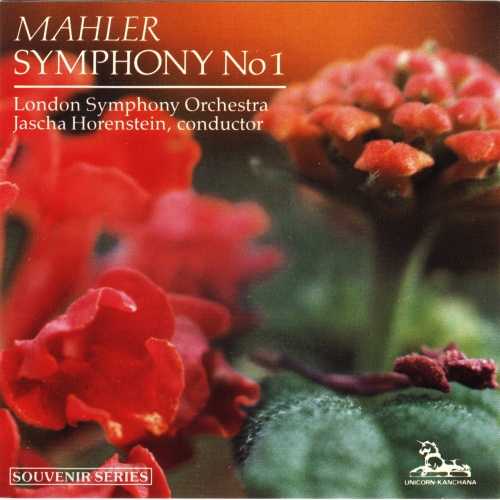
Audio CD
Format: APE (image+cue)
Label: Unicorn
Size: 228 MB
Recovery: +3%
Scan: yes
01. 1st Movement – Langsam, Schleppend. wei ein Naturlaut
02. 2nd Movement – Kraftig Bewegt, Noch nicht zu Schnell
03. 3rd Movement – Feierlich und gemessen, ohne zu Schleppen
04. 4th Movement – Sturmisch Bewegt
The Definitive Recording
Horenstein’s LSO recording of Mahler’s first was considered by the critics back in the 1970’s, when it was issued, to be the finest available. While it has been surpassed sonically by newer recordings, it remains, to me, the ideal interpretation, chiefly for the pacing of the finale (he takes over 22 minutes for the fourth movement; by comparison, Alsop [Baltimore Symphony] takes 18, and that is fairly comparable with most other conductors). The score, at the climax of the 4th movement, is marked “Triumphal. Pesante.” Only Horenstein observes that and the difference is extraordinary. To paraphrase one critic, the other conductors all seem as though they are running late for a dinner engagement and rush through the ending. Recordings by Bruno Walter (who actually conducted with and for Mahler toward the end of the composer’s career, and presumably heard the composer conduct this symphony) are close to this interpretation, but I think Horenstein is the best.
Mahler’s First
Another winner in Gergiev and the LSO’s cycle of Mahler symphonies. The performance is solid throughout. Gergiev doesn’t over indulge the score and seems to let Mahler’s notes entertain us.
This is Mahler’s first symphony, and though it sparkles with many of the orchestral splendors that show up in later works, it is his first major work.
To Gergiev’s credit, he does not go beyond the score and conduct this first symphony as though it were a companion to the 5th or 6th symphony. Instead, some of Mahler’s mellower music ala the 4th symphony can be found here.
Make no mistake, this is Gergiev and the LSO, so the climaxes in the 4th movement erupt like volcanoes. The sound is spectacular, like the other cds in this series.
A solid reading of Mahler’s 1st
Mahler’s Symphony No. 1 is a work that is full of youthful zest and spirit. As the very first of his nine (or ten) stunning symphonies, it already shows an unprecedented skill of symphonic writing, beginning the Mahler tradition of using huge orchestras in an attempt to incorporate the whole world into a symphony. Interpreters who try to tackle this work should have a feel for the great underlying structure in this symphony. But, equally important, they must pick up on the exuberant love for life and nature that is all throughout this symphony.
How did Valery Gergiev fare in his reading? Well, first off, I’ll have to say that he is very successful in recognizing the great symphonic structure in this work. His reading doesn’t lack bigness in tone, and there is always a sense of the strong structural backbone present in the symphony. I’m particularly pleased at how well the LSO fares in producing a big tone that can handle the big climaxes in this symphony with a surprising dexterity, something which isn’t always present to this extent in other LSO Live albums. The LSO’s percussion section is better than I’ve ever heard it before and the basses dig deep into their passages with a wonderful snarly tone.
But what I find somewhat lacking in this reading is a sense of blissful contentment and love of nature I feel Mahler has sprinkled throughout this work, particularly in the 1st movement. While the LSO woodwinds play the bird calls that start out this symphony with a clear, precise tone, I’m not swept off my feet in the way that I would like to be. And, in general, Gergiev has a tendency to be so caught up with bigness of sound that he misses the charm. This isn’t true everywhere: the 3rd movement is full yearning sentiment and a love that makes it a decided success for Gergiev. But elsewhere, I can’t quite say the same. The 2nd movement is hardly very folksy and fun, as grand as Gergiev makes it. I’m a bit more sympathetic with Gergiev’s look at the finale, as the orchestral thunder he unleashes is so terrifying. Even there, though, I find it a bit impersonal.
Despite this album’s setbacks, it is still a good, solid reading. It just doesn’t send me into the raptures that one might hope it would.




Thanks
thanks
Thanks
Outstanding Mahler Symp. no 1 – Amongst the very best! Thanks again Whatever!